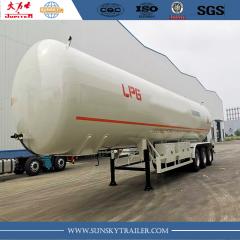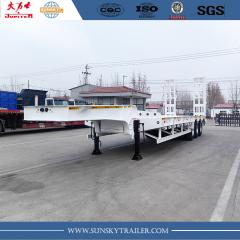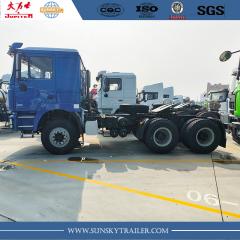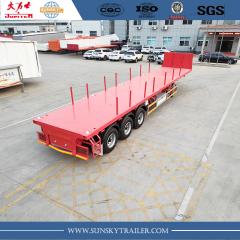-
 3 Axle Lpg Gas Tank Semi Trailer
3 Axle Lpg Gas Tank Semi Trailer
-
 Low Bed Trailer
Low Bed Trailer
-
 SHACMAN F3000 Tractor Truck
SHACMAN F3000 Tractor Truck
-
 Flatbed Pillar Trailer
Flatbed Pillar Trailer
SUNSKY VEHICLE, a manufacturer of flatbed semi-trailers, has found that the Flatbed Pillar Trailer i...
The one-design-fits-all trailer is dead and buried.
Rather than mass produce, the trend nowadays is to design and build tailer-made trailers for the specific needs of customers. “Although our basic design commercial trailers still thrive in a healthy market, it happens more and more that customers ask for a custom design,” says Johnny of China Sunsky Trailers.
“We often complete custom-builds. In fact, we design and build as many commercial trailers as we sell standard products. Lately, we have been designing and building trailers for fleet maintenance companies for vocational use in local government. We’ve recently designed and built trailers to transport a large number of industrial.”
“We were approached by a supplier of generators. His clients needed the generators to be more mobile, so he asked us to design trailers for his product offerings.”
Johnny says you need to be flexible to stay in the trailer game. “If you believe your product offering is the only one that customers would ever need, you are wrong. You need to listen to your customer and stay on top of developments.
“An interesting request recently was from a service provider in the mining industry. We generally build trailers that are used as a means to transport goods from point A to B. But, for this client, we designed and built a trailer with a lighting setup that can extend very high and then fold up in a fairly compact space when it needs to be transported again.”
Smart trailers
Edwin, sales and marketing director at Sunsky Trailer, says his company’s philosophy now is to offer ‘intelligent’ trailer technologies to customers by providing solutions that are safer, offer lower costs per kilometre to the operator, have improved longevity, and boost productivity.
He says customer-driven innovation is a cornerstone of its new approach. “We have developed a manufacturing process that uses the best design tools, materials and components available in the world market.”
Edwin says, by using the best imported products available – from 3D-animation design tools to high-tensile steel, premium quality running gear and ancillary equipment – they are able to significantly push the payload envelope without compromising on build strength.
Fit for purpose
It is important that a trailer be built for the purpose it will serve. “You need to plan around your tow vehicle. Your vehicle load capacity and needs must all be in proportion,” says Johnny. “You can always upgrade later when your budget allows for a bigger tow vehicle, or just buy an extra trailer if you have another tow vehicle.
Johnny says they have a new range of Aluminum and Stainless steel tanker semi-trailers for carrying edible milk, drinking water, and fuel.
“Technologies such as electronic braking system (EBS), roll-over prevention, electronic stability programme (ESP) and automated tyre inflation also boost overall vehicle safety,” he adds.
Weigh-in
“Lowering trailer tare mass and total cost of ownership is the holy grail of trailer manufacturing,” says Johnny. “We have an exciting basket of products to really drive the industry forward in terms of safety, durability, overall cost-efficiency and payload productivity, because quality is long remembered after price is forgotten.”
Although people may think steel is steel, says Johnny, they have started using composite materials for specialised bodies on some of their trailers. “We have managed to save from 15% upwards of the total weight of the trailer. Although these materials are 10% more expensive than steel, it saves time, there is less welding needed and less distortion. Joining can be done with adhesives and this works especially well with event trailers.” Our new range of Aluminum material tanker, bulk carrier and van trailers make the trailer lighter and carry more.
Related Tags:fuel tank semi-trailer,container tipper semi trailer,aluminum bulk tanker semi-trailer




